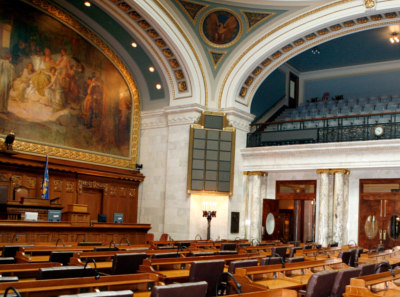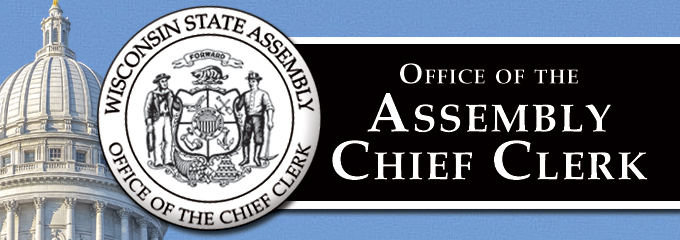Legislative bodies have always needed someone to record their activities and handle administrative duties. The profession of chief clerk dates back to 1363 when Robert de Melton was Clerk of the House of Commons. The first clerk in the United States dates back to 1619 when John Twine was Clerk of the House of Burgesses in the Colony of Virginia. Today, the legislative bodies in every state have a record-keeping and administrative officer referred to either as a "Chief Clerk" or "Secretary".
In Wisconsin, the importance of a chief clerk is recognized in the Wisconsin Constitution which was ratified by a vote of the people in 1848. Article XIII, Section 6 of the Wisconsin Constitution states that "the elective officers of the legislature, other than the presiding officers shall be a chief clerk and a sergeant at arms, to be elected by each house." The first session of the Wisconsin Legislature convened in Madison on June 5, 1848. Daniel N. Johnson was the first Chief Clerk to serve in the Assembly.
Since Wisconsin's admission to the union as the 30th state, 39 men and 1 woman (Joanne M. Duren from 1983-1987) have served as Chief Clerk of the Assembly. C.E. Shaffer had the longest tenure as Chief Clerk, serving from 1907-1933. John A. Scocos is the only person to serve as both of the elected officers named in the Wisconsin Constitution. Mr. Scocos held the position of Assembly Sergeant at Arms from 1995-1997 and Assembly Chief Clerk from January 2001 until he resigned on March 15, 2002.
Many chief clerks also were elected members of the Assembly at one time, either prior to or after their service as chief clerk. However, two Assembly Chief Clerks also served terms as Speaker of the Assembly. Norman C. Anderson, Chief Clerk for the 1959-1960 session of the Assembly, was elected Speaker of the Assembly in January 1972 and served as Speaker until January 1977. Robert G. Marotz was elected Speaker for the 1957-1958 session and later served as Chief Clerk for the 1961-1962 session.
List of Assembly Chief Clerks
2023-2024 Assembly Party Leaders
Robin Vos (GOP) - Assembly Speaker
Kevin Petersen (GOP) - Speaker Pro Tempore
Tyler August (GOP) - Majority Leader
Jon Plumer (GOP) - Assistant Majority Leader
Greta Neubauer (Dem) - Minority Leader
Kalan Haywood (Dem) - Assistant Minority Leader
The office of Speaker Pro Tempore was first used in 1959.
The offices of Assistant Majority and Minority Leaders were used sporadically until 1973.
Assembly Women of Distinction
- Mildred Barber, Hellen M. Brooks, and Helen F. Thompson were the first female members of the Wisconsin Legislature, each elected to serve in the 1925 session. Originally, women elected state representatives were called "Assemblymen" like their male colleagues. In 1969, the official title for all Assembly members was changed to "Representative to the Assembly." The following facts provide a snapshot of the progress of women in the State Assembly:
- Assemblyman Helen Thompson became the first woman to chair a committee (Engrossed Bills) in 1927.
- Assemblyman Ruth Bachhuber Doyle tried, unsuccessfully in 1951, to secure employment for a female applicant to the Assembly Sergeant-at-Arms staff. The Sergeant refused to hire a woman. Ruth Doyle is the mother of James E. Doyle, the former Governor (2003-2010) and who served as Attorney General from 1991-2003. Ruth Doyle was the 4th generation of her family to serve in the Wisconsin Assembly, following in the footsteps of her father (Frank E. Bachhuber, 1933), grandfather (Andrew Bachhuber, 1885), and great-grandfather (Max Bachhuber, 1860, 1864 and 1875).
- Representative Marcia P. Coggs was the first African-American woman elected to serve in the Assembly in 1977.
- Representative Louise Tesmer became the first woman to serve as Deputy Speaker in the 1981 session.
- Representative Mary Lou Munts was the first woman to co-chair the Finance Committee in 1983.
- Representative Betty J. Nelsen was elected the first woman Republican Minority Leader in 1987.
- Representative Barbara Notestein was elected the first woman Democratic Assistant Majority Leader in 1991.
- Representative Judy Klusman was elected the first woman Republican Assistant Majority Leader in 1995.
- Representative Shirley Krug was elected the first woman Democratic Minority Leader in 1998.
- Representative Annette Polly Williams was the longest serving woman legislator in either house, who served in the Assembly from 1980 through 2010.
- Representative Esther Doughty Luckhardt was the second longest serving woman legislator, who served in the Assembly from 1963-1983.
- Representative Susan Engeleiter was the youngest woman elected to the Wisconsin Legislature. She was 22 when she took office in January 1975.
- Representative JoCasta Zamarripa was the first Latina to serve in the Wisconsin Legislature, elected in 2011. Representative Jessie Rodriguez is the second Latina to serve, elected in 2015.
- Representative Margaret Farrow became the 42nd Lieutenant Governor and the first female to hold the office when she was sworn in on May 9, 2001. She was appointed by Governor Scott McCallum and confirmed by both the Assembly and Senate to fill the vacancy created when Governor Tommy Thompson resigned from office and Scott McCallum became Governor. Margaret Farrow served in the Assembly from 1986-1989 and in the Senate from 1989-2001.
- Representative Peggy Lautenschlager became the first woman elected as Attorney General in Wisconsin in 2003. She served in the Wisconsin Assembly from 1989-1992.
- Representative Tammy Baldwin became the first woman from Wisconsin to be elected to the United States Senate in 2013. She served in the Wisconsin Assembly from 1993-1999 and the United States House of Representatives from 1999-2012.
- Representative Gwen Moore served in the Wisconsin State Assembly from 1990-1993 and was the first African-American elected to the Wisconsin State Senate in 1993 and served until 2005. She was elected to the United States House of Representatives in 2004 and continues to serve in that role today.
- Representative Francesca Hong is the first Asian American to serve in the Wisconsin Assembly, elected in 2021.
Assembly Notables
Many notable men and women have passed through the Assembly Chamber to serve Wisconsin in other governmental capacities. Following is a list of those individuals and the positions they held. The (*) indicates posts currently serving.
Governor
Anthony Earl, Patrick Lucey, Vernon W. Thomson, Tommy G. Thompson, Scott Walker
Lieutenant Governor
Patrick Lucey, Russell Olson, Margaret Farrow, Mandela Barnes, Sara Rodriguez*
Attorney General
Grover L. Broadfoot, Vernon W. Thomson, Peggy Lautenschlager
Secretary of State
Fred R. Zimmerman
State Treasurer
Harold W. Clemens, Cate Zeuske
Superintendent of Public Instruction
Herbert J. Grover
Federal Judge
John Shabaz
U.S. Senator
Tammy Baldwin*, Angus Cameron, Irvine L. Lenroot, William Proxmire, Joseph V. Quarles, Philetus Sawyer, John C. Spooner, William F. Vilas
U.S. Representative
There have been 60 Wisconsin Assembly members elected to the House of Representatives, including:
Al Baldus, Tammy Baldwin, Peter Barca, Tom Barrett, Harold Froehlich, Mark Green, Steve Gunderson, Gerald Kleczka, Jim Moody, Gwen Moore, David Obey, Mark Pocan, Tobias Roth, F. James Sensenbrenner, Glenn Grothman
Supreme Court Justice
Grover L. Broadfoot, John B. Cassoday, Louis J. Ceci, William P. Lyon, Alfred W. Newman, Harlow S. Orton, Silas U. Pinney, David T. Prosser, Jr., E. Ray Stevens, David Taylor, Jon Wilcox
Presidential Appointments
Alexander Randall: First Wisconsinite to be named to a presidential cabinet post as Postmaster General for President Andrew Johnson in 1866
William F. Vilas: Postmaster General in 1855 and Secretary of the Interior Department in 1888, named by President Grover Cleveland
Tommy G. Thompson: Secretary of Department of Health and Human Services (2001-2004), named by President George. W. Bush
Federal Appointments
Peter Barca: Small Business Administration
Susan Engeleiter: Small Business Administration
Peggy Lautenschlager: U.S. District Attorney
Tom Loftus: U.S. Ambassador to Norway
Betty Jo Nelson: Department of Agriculture
Appeals, Courts and County Court Judge
Thomas Barland, Michael Barron, Ervin M. Bruner, David Dancey, David Deininger, William J. Duffy, Harold Froehlich, Alexander Grant, Frederick Kessler, Robert W. Landry, Ernest Keppler, John McCormick, Earl Schmidt, Harry Synder, Louise Tesmer, Mary K. Wagner, Joseph Wimmer
State Senator
There have been 460 Wisconsin Assembly members elected to the Wisconsin Senate, including the following members of the 2023-2024 session:
Melissa Agard, Joan Ballweg, Rachael Cabral-Guevara, Tim Carpenter, Robert Cowles, Mary Felzkowski, Dianne Hesselbein, Rob Hutton, Andre Jacque, John Jagler, Jesse James, LaTonya Johnson, Chris Kapenga, Dan Knodl, Howard Marklein, Stephen Nass, Romaine Quinn, Kelda Roys, Jeff Smith, Mark Spreitzer, Rob Stafsholt, Duey Stroebel, Lena Taylor, Patrick Testin, and Robert Wirch.
State Agency Secretary
Mike Huebsch: Secretary of Administration
LaVerne Ausman: Agriculture, Trade & Consumer Protection
G. H. Bakke, Mark Gottlieb: Transportation
Ben Brancel, James Harsdorf: Agriculture, Trade and Consumer Protection
Dennis J. Conta: Revenue
Anthony Earl: Administration and Natural Resources
Patricia Goodrich: Health and Social Services
Robert Haase: Insurance Commission
Doris Hanson: Executive Director of TEACH Wisconsin
Jim Rutkowski: Labor and Industry Review Commission
Carl Thompson: Labor & Industry Review Commission
Stanley York: Industry, Labor & Human Relations, & Public Service Commission
Phil Montgomery: Public Service Commission
Cate Zeuske: Secretary of Revenue
Jim Holperin: Secretary of Tourism
Antonio Riley: Wisconsin Housing and Economic Development Authority; Peter Barca, Department of Revenue
Mayor
John Antaramian, Kenosha; Tom Barrett, Milwaukee; Jeannette Bell, West Allis; Lawrence P. Kelly, Cudahy; John Medinger, LaCrosse; John Norquist, Milwaukee; John Robinson, Wausau; Harvey Stower, Amery; Cory Mason, Racine; Eric Genrich, Green Bay; Dean Kaufert, Neenah
County Executive
Jonathon Barry and Joe Parisi, Dane; Scott Walker, Milwaukee; David Crowley, Milwaukee; Paul Farrow, Waukesha; Tom Nelson, Outagamie; Samantha Kerkman, Kenosha; Daniel Vrakas, Waukesha; Bob Ziegelbauer, Manitowoc; James Kreuser, Kenosha
Salary History
• 2023 - $57,408 per year and a $77.85 per diem/day and up to $155.70 per diem/overnight.
• 2021 - $55,141 per year and a $76.50 per diem/day and up to $153 per diem/overnight.
• 2019 - $52,999 per year and a $81.00 per diem/day and up to $162 per diem/overnight.
• 2017 - $50,950 per year and a $78.50 per diem/day and up to $157 per diem/overnight.
• 2015 - $50,950 per year and a $69 per diem/day and up to $138 per diem/overnight.
• 2013 - $49,943 per year and a $88 per diem. Members of the Assembly that live in Dane County have a per diem of $44.
• 2011 - $49,943 per year and a $88 per diem. Members of the Assembly that live in Dane County have a per diem of $44.
• 2009 - $49,943 per year and a $88 per diem. Members of the Assembly that live in Dane County have a per diem of $44.
• 2007 - $47,413 per year and a $88 per diem. Members of the Assembly that live in Dane County have a per diem of $44.
• 2005 - $45,569 per year and a $88 per diem. Members of the Assembly that live in Dane County have a per diem of $44.
• 2003 - $45,569 per year and a $88 per diem. Members of the Assembly that live in Dane County have a per diem of $44.
• 2001 - $44,233 per year and a $88 per diem.
• 1999 - $41,809 per year and a $75 per diem.
• 1987 - $29,992 per year and maximum per diem increased to $55.
• 1977 - $17,843 per year and maximum per diem increased to $30.
• 1967 - $8,400 per year.
• 1963 - $300 per month and monthly allowance was replaced by a $15 "per diem".
• 1957 - Monthly room and board allowance maximum increased to $175.
• 1951 - $200 per month.
• 1949 - Monthly room and board allowance not to exceed $100 for any number of calendar months in regular or special session added to salary.
• 1931 - $100 per month for biennium with $25 per month stipend for Speaker.
• 1883 - $500 per biennium with $500 biennial stipend for Speaker.
• 1868 - $350 per year with a $350 annual stipend for Speaker.
• 1848 - $2.50 for each day’s attendance.











